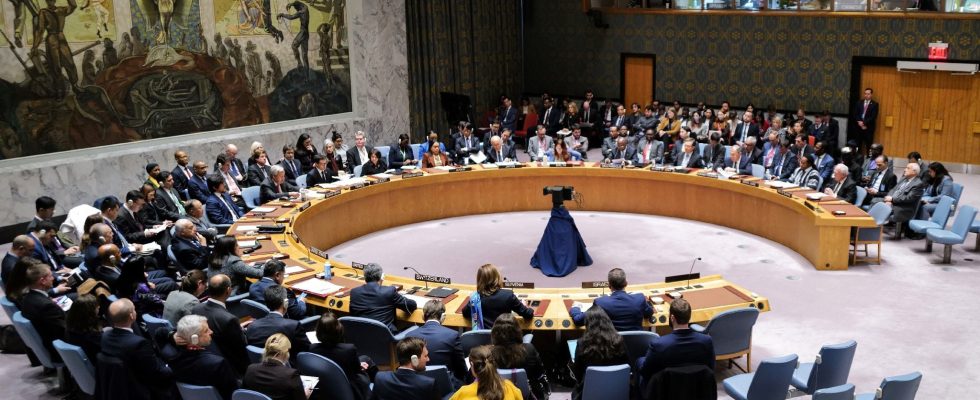The United States threatened, this Sunday, February 18, to block a new draft resolution at the UN Security Council to end the fighting between Israel and Hamas in the Gaza Strip. The text, at the initiative of Algeria, “demands an immediate humanitarian ceasefire”. At the same time, Qatar, mediator of the ongoing negotiations for a truce, has been pessimistic in recent days. In Tel Aviv, thousands of Israelis demonstrated to demand from the government an agreement on the release of hostages with Hamas.
Information to remember
⇒ The United States threatens to block a new vote on a ceasefire in Gaza
⇒ Qatar, mediator of negotiations for a truce, has said it is pessimistic in recent days
⇒ Benjamin Netanyahu is determined to lead a ground offensive in Rafah
The United States will block a new text for a ceasefire at the UN
Designed after the decision at the end of January by the International Court of Justice which called on Israel to prevent any possible act of “genocide” in Gaza, this new draft resolution at the initiative of Algeria “demands a humanitarian ceasefire immediate which must be respected by all parties”, according to its latest version. He also refuses “the forced displacement of the Palestinian civilian population” and once again calls for the release of all the hostages taken to Gaza during the October 7 attack.
Algiers has requested a vote be held next Tuesday. The United States has already threatened a veto as during previous votes in mid-October and early December despite pressure from the international community in the face of the humanitarian crisis in Gaza. “If we came to a vote on the current draft, it would not be adopted,” said their ambassador to the UN, Linda Thomas-Greenfield, in a press release.
Egypt “rejects the displacement of Palestinians on its territory”
On the ground, Israeli Prime Minister Benjamin Netanyahu said he was determined, Saturday February 17, to carry out a ground offensive in Rafah, a border town with Egypt, where 1.4 million Palestinians are crowded together, despite calls of part of the international community including the United States. In recent days, an Egyptian NGO and the Wall Street Journal reported that Egypt was building a closed and secure camp in the Sinai intended to accommodate Palestinian refugees in the event of an Israeli offensive on Rafah.
During a telephone call with his French counterpart Emmanuel Macron, Egyptian President Abdel-Fattah al-Sissi, according to his services, repeated “Egypt’s categorical position of rejecting the movement of Palestinians towards (its territory, Editor’s note) in any form.”
Negotiations “not very promising”
Negotiations involving Egyptian, American and Qatari mediators to obtain a truce between Hamas and Israel, including an exchange between Israeli hostages and Palestinian prisoners, have taken place in recent weeks. They have “not been very promising in recent days,” said Qatar Prime Minister Mohammed bin Abdelrahmane al-Thani in Munich. But “we will do our best to get closer” to an agreement, he added.
Hamas threatened to walk out of talks on a possible truce if “(humanitarian) aid was not delivered to northern Gaza.” Its leader, Ismail Haniyeh, repeated that his movement demanded a ceasefire and Israeli withdrawal from Gaza as part of the negotiations, conditions rejected by Israel.
UN warns of risk of famine in Gaza
As more aid arrived in Rafah on Saturday, the UN warned that residents of the Gaza Strip risked starvation. “We are not going to die from the bombs, but from hunger,” said Mohammed Nassar, a 50-year-old Palestinian from Jabaliya in northern Gaza.
Demonstration in Tel Aviv for an agreement on the release of hostages
In Tel Aviv, thousands of Israelis demonstrated against the Netanyahu government and called on it to reach a deal to free the hostages. “I beg the Prime Minister and the government to negotiate […] Don’t sentence my husband to death,” Sharon Aloni-Cunio, a hostage who was released with her twins while her husband remains detained in Gaza, said at the rally.
“I don’t want to fuss over getting a dead body,” said Adi Angrest, the sister of another hostage, Matan Angrest. “I ask you to return my brother to me now.”
